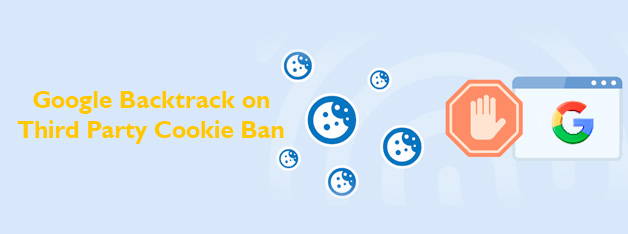Google Backtracks on Third Party Cookie Ban

The digital advertising business has been rocked by Google’s recent move to deprecate the phasing out of third-party cookies in its Chrome browser. This abrupt turnabout represents a critical turning point with far-reaching consequences for consumers, publishers, and advertisers alike.
The termination of third-party cookies has been a major topic of concern and preparedness for the industry for many years. For many years, targeted advertising has been based on these cookies, which are little data files that monitor user activity across websites. Their removal promised a radical change in the way that marketers interact and connect with customers.
Google’s Privacy Sandbox project, which aimed to provide a privacy-focused substitute for third-party cookies, had several difficulties. The decision to postpone the cookie deprecation was made due to worries about possible anti-competitive activity, the difficulty of implementation, and the effect on the larger digital ecosystem.
Although this reprieve provides advertisers facing the difficulties of a cookie-less future with some brief relief, it’s important to acknowledge that the core issues still exist. Consumer worries about data security and privacy are not going away, and governmental oversight is growing.
For advertisers to succeed in this changing environment, they need to take a diversified approach:
• Vary Your Targeting Approaches: It’s Not a Good Idea to Depend Only on Third-Party Cookies. It’s critical to investigate alternate targeting strategies like look-alike modelling, first-party data, and contextual advertising.
• Make an Investment in Data Infrastructure: Accurate targeting and measurement depend on a solid data base. When paired with sophisticated analytics, first-party data can offer insightful information about customer behaviour.
• Fortify Publisher Partnerships: By working together to obtain publishers’ first-party data, targeting capabilities may be improved, and campaign performance can be raised.
• Adopt Privacy-Centric Technologies: Implementing identification solutions and data clean rooms can help strike a compromise between the requirement for efficient advertising and privacy concerns.
• Get Ready for Regulatory Changes: It’s critical to keep up with the latest privacy laws. Increasing marketing compliance
The Broader Impact
The choice made by Google affects more than just the advertising sector. Publishers may receive mixed feedback since many have been excitedly awaiting the shift to a world without cookies. Although keeping cookies in place can temporarily increase ad income, it also solidifies Google’s hegemony in the digital advertising space.
In addition, regulatory oversight is probably going to get closer. The choice to keep using third-party cookies may rekindle worries about competition and data privacy. Regulators might step up their efforts to enforce more stringent guidelines for the gathering and use of data.
In the end, there are several decisions facing the digital advertising sector. Even if the near future can appear unclear, it is obvious that a significant change is unavoidable. Publishers and advertisers need to adjust to a future where data-driven marketing is critical, and privacy is of utmost importance. Industry participants may set themselves up for long-term success by adopting new technology, forming reliable alliances, and placing a high priority on user experience.
Ads may successfully navigate this complex landscape and come out on top with smart planning and flexibility, even though the path ahead is surely difficult.
The Consumer Perspective
Although publishers and advertisers have received the majority of attention, it’s crucial to take into account how Google’s decision may affect customers. The primary goal of the third-party cookie phaseout was to improve user privacy by minimising the quantity of information gathered and disseminated among websites.
Google has decided to keep using third-party cookies, although this will probably spark new debates over consumer rights and data protection. The growing awareness among customers about the uses of their data will lead to an increased desire for openness and control.
Publishers and advertisers need to understand that establishing consumer trust is crucial to their long-term success. Clear choices for customers to choose their privacy settings and openness on data gathering and usage policies will continue to grow.
Publishers and advertisers need to understand that establishing consumer trust is crucial to their long-term success. Gaining customer trust will require being open and honest about data gathering and usage procedures as well as giving them easy ways to adjust their privacy settings.
Conclusion:
In summary, the digital advertising industry now faces a complex and unclear picture because of Google’s decision to maintain third-party cookies. Advertisers may feel less anxious about the near future, but the fundamental difficulties still exist. Industry participants may move through this new era and come out stronger by taking a proactive and flexible attitude.
